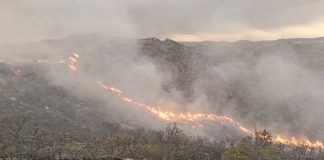Climatic conditions favourable for further outbreaks
More than 1 000 horses were under threat from African horse sickness in the eastern parts of the Eastern Cape alone, said Buffalo City State Veterinarian, Dr Stuart Varrie. A total of 44 cases of the deadly AHS have already been confirmed in the eastern parts of the province at the time of writing. There was also a suspected case in Grahamstown. AHS outbreaks have also been confirmed in North West, with one case in the Randfontein area in Gauteng and another near Durban in KwaZulu-Natal. Varrie said that the situation remained critical because the prevailing climatic conditions were favourable for outbreaks.
Vaccination
“There’s a lot of criticism doing the rounds as to the fact that the registered OBP vaccine does not work,” said Varrie. “This is true up to a point, in that not every horse will be completely protected from every serotype of horse sickness, even after multiple vaccinations.” At this stage, all laboratory-confirmed cases have shown that Serotype 6 is involved. But this could change, as there are nine serotypes of the virus and each is immunologically distinct, cautioned Varrie.
“The OBP vaccine does, however, contrary to the information being spread, cover all nine serotypes,” he said. Clive Webster, who farms near Komga, said AHS was very difficult to diagnose. “A horse that still seemed healthy the previous evening could be dead the following morning. I have lost 14 of my horses in three weeks,” he added.
Co-operation
So far there’s been excellent co-operation from horse owners regarding the movement of animals, said Varrie. In fact, he added, he’s only aware of one instance where horses have been moved contrary to the appeal that was made. “We’ve also experienced very good co-operation from the horse societies and the organisers of shows,” he said. “I’ve been contacted by a number of organisers regarding the advisability of continuing with planned shows and allowing horses from certain areas to go to the shows.”
New cases
Varrie was, however, expecting more cases to be reported in the coming weeks. He said there remained a group of horse owners opposed to vaccinating, adding that a single vaccination in the face of the current outbreak could never give the protection that a regular annual programme would achieve.
Compulsory
Stabling horses at night also protected them. This was because the midges (Culicoides imicola) that acted as the vector of the virus between horses did not readily go under a roofed structure, and were primarily active from dusk to dawn. “This is not a contagious disease, so it cannot spread directly from one horse to another even if that horse is infected. A vector has to be involved,” said Varrie.
Dr Grietjie de Klerk, chief state veterinarian: epidemiology, Directorate: Animal Health at the Department of Agriculture, Forestry and Fisheries in Pretoria, confirmed that AHS outbreaks had occurred in various parts of the country. She also said the Animal Disease Act, 1984 (Act 35 of 1984) made reporting of AHS outbreaks to State Veterinary Services compulsory. De Klerk said that the local state veterinarian advised on the AHS status of the relevant area. For information, horse owners can contact the provincial director of veterinary services, said De Klerk.












